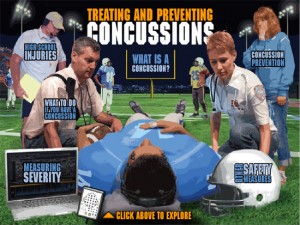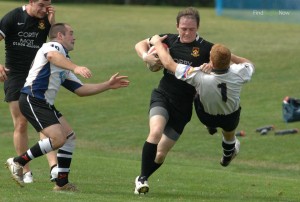 Professional football has had an increase in the number of head injuries resulting in concussions, following three recent high-profile incidents involving English Premier League players, resulting in FIFPro’s medical advisor, Dr. Vincent Gouttebage, putting professional football and its concussion policies under the microscope.
Professional football has had an increase in the number of head injuries resulting in concussions, following three recent high-profile incidents involving English Premier League players, resulting in FIFPro’s medical advisor, Dr. Vincent Gouttebage, putting professional football and its concussion policies under the microscope.
Tottenham Hotspur’s French international goalkeeper, Hugo Lloris, was knocked out after a collision with Everton striker Romelu Lukaku on November 3. Despite losing consciousness, and after receiving nine minutes of treatment, Lloris was deemed fit to continue by Tottenham’s medical staff.
Concussions are a common sports injury in many sport disciplines across the world and involves a sudden but short-lived loss of mental function that occurs after a blow or other injury to the head. It is the most common but least serious type of brain injury.
In professional Rugby Union, 5% to 10% of the injuries are attributed to concussions. In South Africa, the rate of concussions was reported to be 50% in schoolboy rugby players and 20% in adult Super 12 rugby players (Patricios 2010).
The International Rugby Board’s guidelines, which are based on the Zurich 2012 consensus statement, emphasize that concussion must be taken extremely seriously to safeguard the long-term welfare of the players.
Thus, any rugby player suspected of having concussion must be removed from the field and must not resume play in the match.
A leading sports doctor has warned that the sport should expect to face a series of legal claims from former players suffering with the efefcts of concussion injuries. Dr. Barry O’Driscoll, a former Ireland international, says the sport will soon find itself in a similar situation to American football.
The National Football League (NFL) recently reached a $765m settlement with a group of more than 4,500 former players who claimed that it had concealed the risk of long-term brain damage from their past injuries.
 O’Driscoll has claimed that the sport’s authorities were “mad” and “cavalier in the extreme” in their approach towards concussion.
O’Driscoll has claimed that the sport’s authorities were “mad” and “cavalier in the extreme” in their approach towards concussion.
He also argues that the suspicion of concussion alone should be reason enough to remove a player from a game. “I think the lawyers are licking their lips, I really do,” he said. O’Driscoll added that players who have a pitch-side concussion assessment and are allowed to go back on could, in five or 10 years, “start getting severely depressed or migrained”.
IRB’s new Pitch-side Concussion Assessment (PCSA), which results when a players who is suspected to be suffering with concussion leaves the field for five minutes to undergo standardised tests, provides inadequate protection against the risk of serious injury, O’Driscol said.
The Rugby Football Union’s head of sports medicine, Dr. Simon Kemp, pointed out that since the PSCA was introduced, instances of players returning to the field while suffering concussion had fallen from 56% to 13% of all diagnosed cases.
However, is this enough to keep our rugby player’s safe?
Notes to Players
There is a basic level of understanding that all players should have in relation to head injuries and potential concussions. Here are four key points:
- The majority of concussions do not involve a loss of consciousness. Stop playing even if you don’t lose consciousness;
- A player does not need to hit his or her head to get a concussion. An intense blow to another part of the body, causing the head to jerk rapidly, can also cause a concussion;
- A player suspected of having a concussion should not return to play until all post-concussion symptoms are gone. Experiencing a second concussion before the first has fully healed can lead to permanent brain damage and even death; and
- Concussions may cause more prolonged damage in children than adults. Children should be monitored for concussion symptoms for more than 24 hours.
More Information
 Learn more about concussions in this article, where Liz Ward describes concussions as “minor traumatic brain injury”. A helpful interactive infographic about concussions can also be found here.
Learn more about concussions in this article, where Liz Ward describes concussions as “minor traumatic brain injury”. A helpful interactive infographic about concussions can also be found here.
The BBC has also recently written about this topic here with interviews from Stuart Lancaster and Dr Barry O’Driscoll.








 When most people hear the word “Peloton” they think of an expensive black bike with shiny red buttons and that controversial commercial where the husband gifted his wife a Peloton for Christmas.
When most people hear the word “Peloton” they think of an expensive black bike with shiny red buttons and that controversial commercial where the husband gifted his wife a Peloton for Christmas. If the app interests you, Peloton is currently offering a 30 day FREE TRIAL, so why not give it a try? Check it out
If the app interests you, Peloton is currently offering a 30 day FREE TRIAL, so why not give it a try? Check it out 

 This article would not be complete, however, if we did not acknowledge some of the delivery issues that have been plaguing Peloton over the last year. Most of the delivery issues seem to affect U.S. deliveries, however, the UK deliveries have been affected as well.
This article would not be complete, however, if we did not acknowledge some of the delivery issues that have been plaguing Peloton over the last year. Most of the delivery issues seem to affect U.S. deliveries, however, the UK deliveries have been affected as well.







